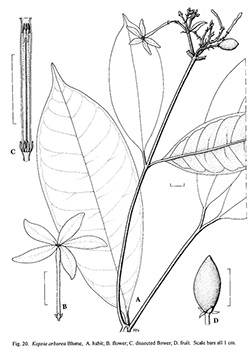e-Flora of Thailand
Volume 7 > Part 1 > Year 1999 > Page 61 > Apocynaceae > Kopsia
2. Kopsia arborea Blumewfo-0000221354
Catalogus 13. 1823; Timmerman-van der Sleesen, Fl. Mal. Misc. Rec. 1: 9. 1959; Backer & Bakh.f., Fl. Java 2: 232. 1965; Markgr., Blumea 20: 419. 1972; Li et al., Fl. China 16: 162. 1995. Fig. 20.
Accepted Name : This is currently accepted.
Synonyms & Citations :
Description : Shrub or tree to 12 m. Branchlets minutely puberulent or glabrous. Leaves: petiole 4–8 mm long; blade coriaceous or subcoriaceous, elliptic, 7–21.8 x 1.6–6 cm, apex acuminate, base cuneate to acute; secondary veins 15–18 pairs; glabrous. Inflorescence a lax cyme; glabrous or puberulent; 6.5–9 cm long; pedicels 1.5–2.5 mm long. Sepals lanceolate, 2.4–2.7 x 1.3–1.6 mm, apex acuminate or acute; glabrous or puberulent. Corolla white; tube 28–35 mm long; lobes 14–19 mm long, lanceolate; glabrous outside or with ciliate lobes, pubescent in mouth and beneath stamens inside. Stamens inserted at 25–32 mm from corolla base; filaments 1.1 mm long; anthers 1.7 x 0.5 mm. Disk 1.6–2.1 mm long. Ovary 0.9–1.1 mm long, pubescent or glabrous; style + pistil head 2.5–2.6 cm long. Fruit ovoid; 2.6–3.9 cm long, 1.1–2.2 cm wide.
Thailand : NORTHERN: Chiang Mai; EASTERN: Chaiyaphum; PENINSULAR: Nakhon Si Thammarat.
Distribution : China, Vietnam, Malaysia, Indonesia (type from Java), the Philippines, Australia (Queensland).
Ecology : In evergreen forests to 1,000 m alt.
Vernacular : Madi khwai (มะดีควาย)(Northern); phut dong (พุดดง)(Chaiyaphum).

